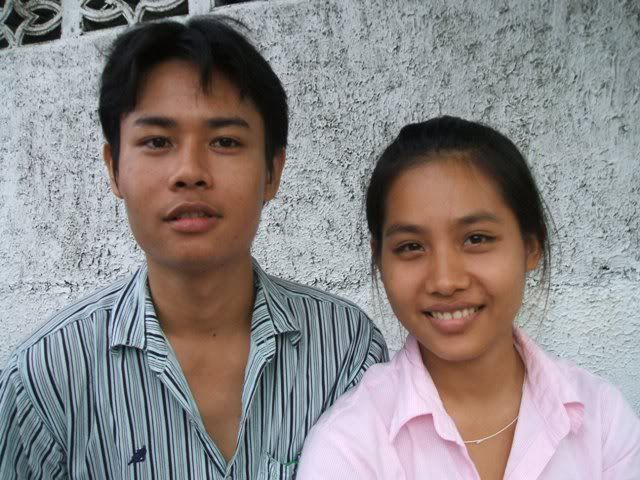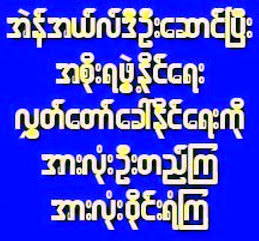By U Win Tin
On June 19 many pro-democracy advocates inside and outside Myanmar paused to commemorate the 65th birthday of our leader, Aung San Suu Kyi.
Many too will take the opportunity to ponder the savage undermining of the democratic process that has occurred since she led the National League for Democracy to win the national elections in 1990.
Now, Myanmar's main political opposition has decided to disband rather than be co-opted into a sham electoral shadow-play being enacted by the military leaders. This decision was based on an in-depth understanding of the tactics of dictators.
Some of our supporters do not understand our decision. However while we as democrats respect the right of all to hold views contrary to our own, we also expect our critics to be well appraised of the issue. It is clear many are not.
The first point of departure for all those analyzing the planned 2010 elections in Myanmar is the constitution under which it will be held. The 2008 basic law seeks to establish a range of encumbrances to the democratic process which make it impossible to see it as anything other than a clumsy attempt to dress rotten wood with the polish and veneer of democracy and progress.
Picture a fine piece of Myanmarese (Burmese) teak, smooth and presentable to the eye, but eaten away underneath.
Most obviously, the constitution ensures a 25 percent quota for members of the military in any parliament. The military is seeking an additional majority quota by fielding a disguised military political party in the election.
So, at best the military is offering three-quarters of a democracy, or less, to the people of Myanmar. This constitution, under which the elections are held this year, carries a range of assaults on democracy.
For instance, this election will not choose a government. It will select those who will fill the legislature and who will then be given the responsibility of selecting the heads of government.
The constitution is unclear on how this process will work in detail, only that the envisaged presidential Electoral College (the Parliament including the military) will decide upon a new President.
If it can be assumed that a basic majority of the parliament will be required, then the 25 percent military representation ensures that considerably less than a majority of the elected members is required to name the new President, who will then in turn fill ministerial and other governmental posts by fiat.
It is, in effect, a recipe for a rump parliament.
That such a crucial component of the election process is clearly undemocratic is untenable. It sets the tone for the whole electoral process and ensures that participation by pro-democracy parties and individuals will lead nowhere in democratic terms.
Other constitutional issues are abound. Among them is the difficulty and unwieldy expense of registering and running a campaign. For instance, the roughly $500 required for each candidate to run will not be refunded post-election and estimates for funding a campaign across all 498 national constituencies run into the hundreds of thousands of dollars, a fortune in one of the world's poorest countries.
Moreover, some have argued that the requirement to name all party members to qualify for formal recognition is simply a means of finding where dissent may be so that a post-election purge may be carried out.
Finally, significant ethnic groups are denied access to the political process. This ensures that large portions of the Myanmarese national constituency are denied their democratic rights.
As a party of democrats, founded on the highest principles of freedom and equality, the National League for Democracy cannot participate in a system that not only denies us our due rights ― as the winners of the 1990 elections, for instance ― but denies fellow Myanmarese political forces appropriate input to the political process.
Surely no self-respectable democrat could countenance such a cave-in to the forces of dictatorship.
Ultimately, the NLD is a social movement as much as a political party. Our goal is to maintain our political party and our social role despite the many overtures from the ruling military to sell out and to be a party to their ruinous dictatorial regime.
Our participation in any election process remains conditional upon the four principles formulated in the NLD's Shwegondaing Declaration of April 2009: release all political prisoners; open dialogue with Aung San Suu Kyi; recognize the 1990 election results; and review the 2008 constitution.
Only with these conditions can democracy find room to flourish in Myanmar.
U Win Tin is co-founder of the National League for Democracy and was imprisoned by the military for 19 years.















